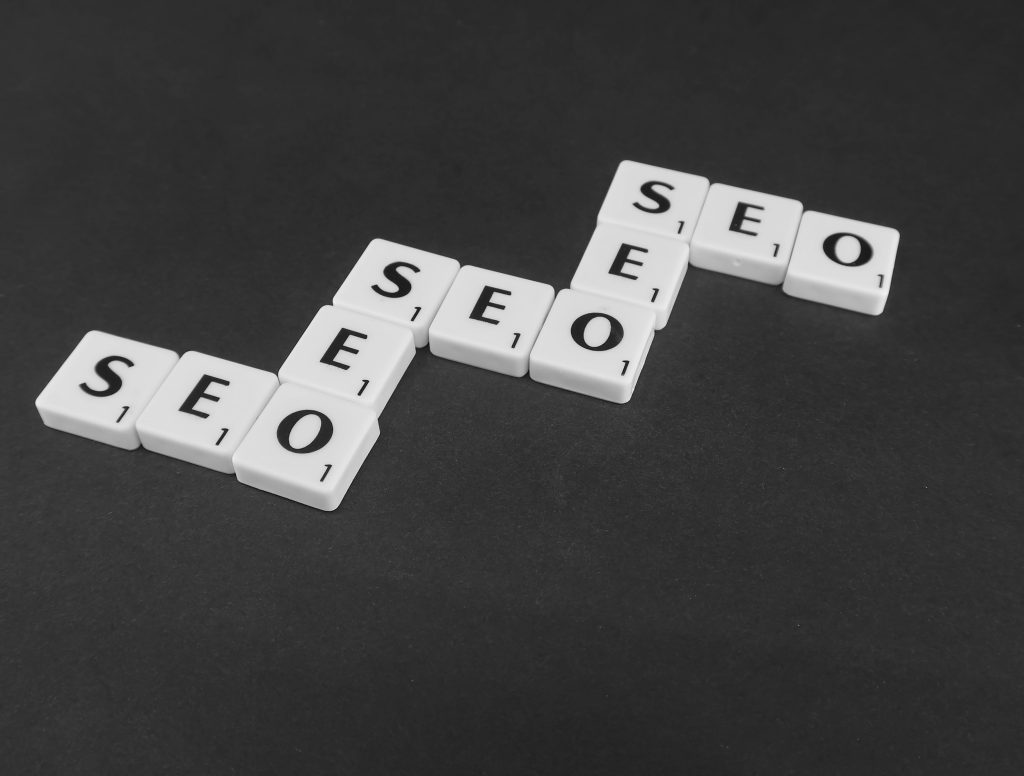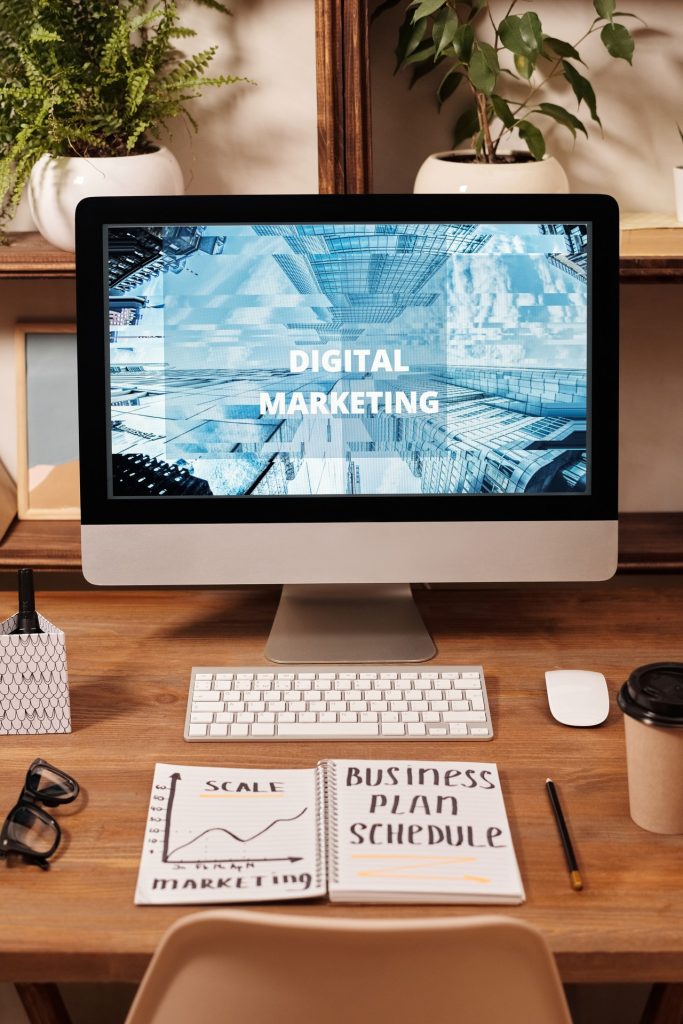Have you considered hiring a small business marketing agency to give your company a boost? There are many ways a marketing professional can help you grow. This article will take a look at some key pillars you may need as part of a comprehensive digital marketing plan, including:
- Search Engine Optimisation
- PPC advertising
- Social media
- Content marketing
- Link building
- Email marketing
- Website optimisation
- Real-world marketing
Ready to find out how digital marketing strategy can help your business grow?

1. SEO
The world of SEO is vast and incorporates a whole lot of activities that in theory should help with business growth. Most small business marketing agency efforts will involve a whole lot of SEO, and with good reason. It’s absolutely crucial for full service marketing services. SEO stands for ‘Search Engine Optimisation’. The simple definition? Making your website rank higher on Google for organic search queries.
So, if somebody Googles ‘restaurants in Sydney’, the restaurants in Sydney with the best SEO will show higher on the search results. This leads to more clicks, more customers and in theory, more profits.
The other interesting thing about SEO is that the results are ongoing. Where other forms of advertising have an immediate impact but disappear quickly, SEO lasts forever. If you speak to a marketing consultant, they’ll likely recommend you invest effort into SEO.
So, what exactly does an SEO campaign look like? Basically, it’s an ongoing effort to improve your website’s standing with Google. With great content, backlinks and website improvements, you can tell Google that website is relevant and valuable to searchers. However, SEO is made up of many, many different activities.
On-page SEO
As the name suggests, on-page SEO is all about what the user can see. So, we’re talking about the visual things like images, video and of course, written content. Everything that your potential customers see should be published in a way that Google likes. This gives your content a much better chance of ranking.
On-page SEO lasts forever. Once you improve it, Google can always see it. Many marketing strategies for small businesses include improving your website’s existing on-page content to get a quick SEO boost. This is because Google’s algorithms change, and certain aspects rise and fall in importance. In the early days, it was all about jamming plenty of keywords into a page. Now, the focus is more on engaging content and link building.
Technical SEO
Technical SEO is what goes on in the back end of your website. Basically, it’s all about setting your website up so that Google can understand it better. This can include canonical URLs, schemas, page speed and other factors that provide Google with relevant information.
In many ways, you can think of technical SEO as a phone line. If it’s not configured properly, your message won’t get through to Google.
Off-Page SEO
Off-page SEO is becoming more and more important in recent years. The off-page SEO can best be described as what goes on outside of your website. So, we’re talking mostly about link building here. When other reputable websites provide a link to your website, it increases your domain authority.
Google realises that other websites and users find your information useful, and therefore it improves your rankings. Some SEO is outside of your control, but off-page SEO efforts are aimed at taking back some of that control. For example, monitoring for toxic backlinks that negatively affect your SEO and taking steps to have them removed.
Local SEO
Finally, there is local SEO. Now, in many ways, local SEO is just a way of describing all SEO efforts for a business targeting local traffic. For example, a restaurant relies heavily on local customers, so they need to rank well for search queries in their geographical area. Ultimately, it isn’t greatly different to normal SEO. It just focuses more heavily on local search.
2. PPC advertising
We’re going to talk about pay-per-click (PPC) advertising separately, even though it will come up a bit later on when we discuss social media. We mention this because PPC advertising is available on some social platforms, but we’re specifically talking about Google advertising here.
PPC advertising on Google involves finding the keywords you want your ads to appear on when customers search. So, again, someone looks up ‘restaurants in Sydney’. The first results you see on Google are ads, so if you pay for your ad to appear on that search, you can get instant exposure to potential customers who are highly motivated to buy.
The good thing is, that you only pay if someone clicks on your ad. This makes it a little easier to track your return on investment, and you avoid paying for people just to see an ad.
So, for a more instant impact, PPC advertising is one of the most popular business marketing approaches. Unlike SEO, however, once you stop paying for PPC ads, they disappear and stop providing you with benefits.

3. Social media
Let’s consider some of the statistics that make business marketing consultants get excited about social media. The old saying when marketing a small business is to meet your target audience where they already are. In this case, social media is that place.
In 2022, Australia has a population of around 25.93 million people. Approximately 21.45 million of us are active social media users. The most popular social media sites are:
- TikTok
It’s little wonder that one of the major promotional strategies for Australian businesses includes social media marketing. With well over 80% of Australians actively using social media every day, it can be a goldmine for marketing ideas.
Facebook ads
There are multiple paid advertising opportunities in the world of social media strategy, however, we’re going to focus mostly on Facebook here. Since Facebook and Instagram are owned by the same company, a lot of what we talk about here is transferrable.
Facebook is the most popular social media network in Australia, and advertising on the platform is becoming increasingly lucrative. With smarter audience targeting to reach the right people, Facebook ads are now better valued than ever.
When a marketing strategy consultant starts developing social media ideas for your small business, paid advertising is likely to be part of it. Your agency should handle the following tasks:
- Researching and running paid advertising campaigns
- Creating the content for your ads
- Optimising ad performance (for example, audience targeting)
- Reporting
- A/B testing the success of different ads
If your target audience is heavily engrossed in social media (and it’s likely they are), you need Facebook ads in your digital marketing strategy.
Content creation and social media management
The other aspect of social media is something that feels a bit more spontaneous and fun, but it doesn’t always need to be. While ads are very targeted, your standard social media content (posts and shares) can feel a bit looser. A marketing business can always work wonders with your social media accounts.
It involves creating content, scheduling posts according to a content management plan, and also creating customer personas and profiles. By developing a brand voice through your social media posts, you not only increase traffic to your website, but you start to develop brand loyalty.
Engaging with customers, and having systems in place for customers to engage with you is crucial to marketing a small business in the modern world. The guru, Neil Patel has some simple tips for beginners in the video below:
4. Content marketing
If you’ve ever heard the expression, “Content is king,” there’s a good reason for it. Content, no matter which way you look at it, is huge when trying to work out how to promote your business. A content creation agency can handle all types of content including written, video, images and much more.
Content can also refer to everything you post on social media. For the purpose of this article, we’re talking about content that is more closely linked to SEO rather than social media. Marketing for small businesses relies heavily on content. Here is how most marketers approach written content.
Content plans and management
It all starts with planning. You can choose to plan a year in advance. Or just plan a month ahead so that you can remain flexible. Basically, a content plan outlines what you’re going to publish and when. It might be a short blog every week, with one longer article each month. Around that, there could be some social media posts.
Managing the content plan is also important, because your goals may change throughout a marketing campaign. So, your small business marketing agency should be able to change direction and focus quickly if needed.
Copywriting services
The most important part of content management is the actual production of content. Copywriting is the art of crafting written content designed to appease Google’s SEO requirements while also being relevant and valuable for your audience. Some copywriting may be more sales-focused, while others might be more informational.
Whether you need sales copy for a landing page, a paid advertisement, a video script or ongoing blogs for your website, copywriting is at the centre of it all.
5. Link building and backlink management
We touched on link building earlier, but it’s an important one to dig a little deeper into. Link building is where your small business marketing agency tries to get other reputable websites to link back to yours. It has a big impact on SEO and Google rankings, but it’s probably the most difficult part of an online marketing campaign.
Link building requires reaching out to relevant industry websites and finding a way to get links. Often, this is done by guest blogging, appearing in interviews or on podcasts. Basically, it’s a tricky one to handle but it delivers high benefits. Backlink management also involves monitoring for bad links, because they can damage your SEO.

6. Email marketing
For many businesses, especially those with a large customer list, email marketing is extremely valuable. It’s a way to connect with customers, introduce special offers, or even just reach out to stay in touch. Like anything, it’s a balancing act because you don’t want to overdo it and have people unsubscribe from your mailing list.
Your digital marketing agency can do a lot with email marketing. In fact, many businesses invest in systems like customer relationship management (CRM) software that automates a lot of email marketing. From welcoming customers who sign up to providing updates on online orders, a lot of email marketing can be automated to make life easy.
7. Website optimisation and development
A lot of small business marketing agencies offer website development services. Whether it’s building a brand-new website, completely revamping an existing one, or simply making relevant updates along the way, this is usually part of a digital marketing engagement.
Depending on what you pay for, a marketing company might provide you with a completely new website design. If you don’t need this though, they can simply tweak your existing site, update content and clean up the technical SEO to give you an online boost.
Conversion rate optimisation
One particular part of website optimisation is around conversion rates. This means improving the user experience on your website and can include several different marketing tips. For example, using ‘Contact Us’ buttons on the right part of the page. The written content could be improved to nurture people towards a sale. You might even try out different colour schemes in line with customer behaviour research.
Ultimately, it’s all about making your website visitors more likely to take a certain action, such as buying, downloading or contacting your business.
Landing pages
Landing pages are specifically designed for the customer to land on. Let’s say, for example, that your digital agency places a Google ad and links the ad to your homepage. Is that really helpful? If the ad targets a specific keyword or product, you should have a landing page designed specifically for that keyword.
For example, in ads for ‘private function venues’, customers should be able to click and get all the information they need about your private functions. If they get taken to the main restaurant page, they then have to go searching for private function information.
Landing pages are all about making it easy for customers to take the action you want them to.

8. Real-world marketing activities
We’ve focused a lot on digital marketing ideas and social media marketing strategies for small businesses. But don’t forget, real-world advertising still works too. Of course, if you hire a specific digital marketing company, this might not be their strong suit. A full marketing company though will look for innovative ways to promote your business.
The list of activities here is endless but can include things like trade shows, print media and TV advertising, sales, signage and so much more. Remember, the digital world is important for modern businesses, but so is the real world where your customers live and breathe.
Looking for a small business marketing agency?
If you need small business marketing that’s tailored to your needs, contact Content Solutions Australia today. We can put together a content marketing package aligned with your business goals. We’re all about business growth, and we’d love to be part of your journey. Get in touch today, because we’re always available to discuss your needs.


